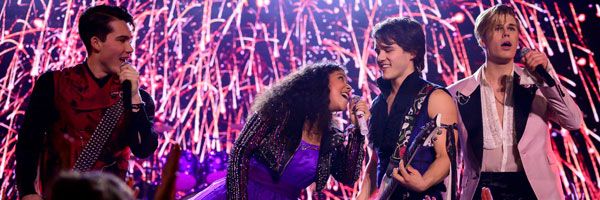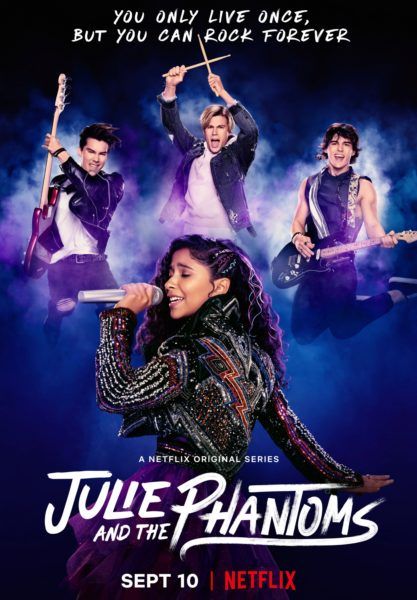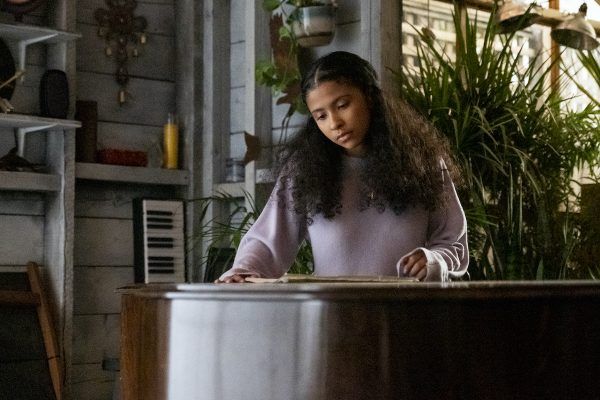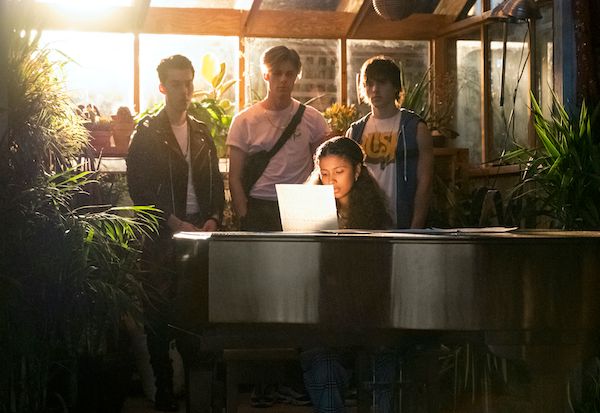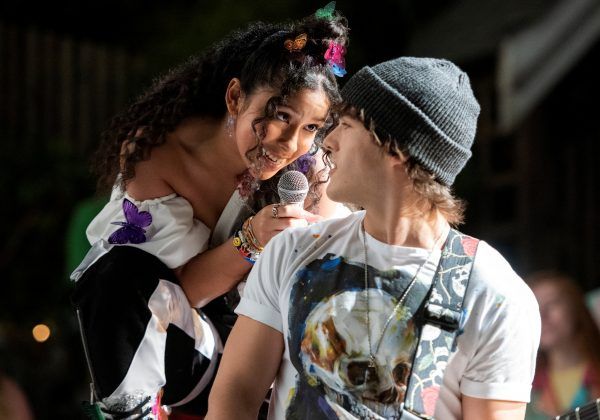[Editor’s note: The following contains spoilers through the Season 1 finale of Julie and the Phantoms, “Stand Tall.”]
From showrunners Dan Cross and David Hoge and director/executive producer Kenny Ortega, the nine-episode, half-hour series Julie and the Phantoms follows high schooler Julie (ultra-talented 16-year-old newcomer Madison Reyes) who’s still reeling from the loss of her mom when the ghosts of three musicians from 1995 — Luke (Charlie Gillespie), Reggie (Jeremy Shada) and Alex (Owen Joyner) — suddenly appear. Their passion for music reignites her own and as they start to write songs together, they quickly realize that while they’re performing, they’re a little less ghostly and can be seen and heard.
During this 1-on-1 interview with Collider, Kenny Ortega talked about why he wanted to bring the original Brazilian TV series to American audiences, how they discovered the show’s star, putting the band together, what it takes to pull this show off, the Julie-Luke dynamic, the season’s cliffhanger ending, and hopes for Season 2. He also talked about his memories of choreographing Dirty Dancing, and the other projects he’s developing at Netflix.
Collider: This show is delightful and I absolutely loved it. It was also a lot more emotional than I expected. When the idea of this re-imagining came your way, how quickly into looking at the original series did you know that it was something you were definitely going to do?
KENNY ORTEGA: I knew that it was something that I definitely wanted to do before I saw the original series. The project was presented to me by George Salinas, who’s one of our executive partners, through my agent. [Showrunners] Dan Cross and Dave Hoge and I were all called into this meeting and it was pitched to us, and I just thought it had heart, spirit, hopefulness, humor and surprise. I just loved the idea of the story of a girl meeting these three teenage ghosts. It had musicality and mythology that we could play with. And then, I watched the series — not all of it but a good portion of it — and I just loved the spirit of the kids and their chemistry and the fun and the music. We were given total freedom to explore our version of the storytelling — the producers of the original show said, “Take it, and with love and support, how fun with it.” So, we placed it in Los Angeles, the City of Angels, and took it to Netflix and now to the world.
There’s something that’s inherently tragic and bittersweet about this story because no matter how good the band is and no matter how much they love each other, these guys are still dead. Is that something you’re trying not to think about as you’re telling the story, or is it something that you always have to think about?
ORTEGA: I just chose to deal with the reality of the moment and less about what the outcome may be, and leave that up to the future. If we’re able to continue forward, which we’re all praying and hoping that we will, Dan and Dave are so bright and so much fun and so capable, and they’ve already written a bible for Season 2 that I’m in love with. Julie’s dad calls these three boys angels because what they brought back for Julie in her life and how she embraced music after meeting them, that’s more where I put my focus. It’s on generosity and the spirit of giving and how we can help each other move through crises and difficult times and come out the other end of it, back on the road and back on our path.
Because of the casts that you’ve assembled in the past, everyone expects you to be able to pull that off every time. Do you feel extra pressure when it comes to casting, to make absolute sure that you’ve gotten it right?
ORTEGA: I have a way of going about casting that I think really serves the overall [project] and it comes from my background in theater. Just take your time and make sure that you’re in the room with partners and not just actors, and that are people that want to be there, that are ready for the experience, that are going to have a voice, and that are brave and are going to take risks and chances. I like to spend time with the actors and come to know the, and to search high and wide to make sure that everybody’s been given a chance to be seen. We found Madison Reyes, after a thousand letters went out to high schools of the performing arts, all across America and Canada. She was a 14-year-old girl that had never been in front of a camera or in a recording studio before. We’d seen hundreds of girls until we saw her, and when that video got put in front of me, I was just bedazzled. I was like, “That’s the girl to beat. There’s the authenticity I’m looking for, the voice I’m looking for, the heart and spirit, and the innocence. And La Padura and Hart, my casting directors, so get me. They never give up until they feel, one hundred percent, that they’re putting in front of me what I’m looking for.
Was there a moment when you were watching Madison that you realized she really could step up and not only handle leading a show, but also leading a band?
ORTEGA: Yeah, they sent me a video, and she had never made an audition video before in her life. She had no instructions. She just went home and told her family to be quiet because she was making a video for Hollywood. She drug her electric piano out onto the porch, and she didn’t know that she only needed to learn her lines. She learned everybody’s lines. And she didn’t have a reader. There was no one off camera reading with her. She came bursting out of the house and she started doing the scene work, and she was just talking to air. Nothing was coming back to her but we knew what was coming back to her because we knew the script. She was talking to ghosts. It was insane. It was just meant to be.
And then, to discover her family: Her mother is a career soldier and her father is an artist. They’re this great, proud Puerto Rican family. It was everything that I was looking for and more. That’s the thing, I have an idea of what it is that I’m looking for, and in the end, I always get more than what I’m looking for. A lot of people go, “How are you going to find that?” And I’m like, “Don’t worry, I’m going to find that and more.” I didn’t put this band together. They found each other. During the process of three days of bringing all different mixes of young women and young men together to audition, each time this group came together, I was seeing something happen that they were doing, not that I was doing. They were forming a band, right before our eyes. By the last day, it was evident. She walked up to the microphone and said, “Hello, everybody, I’m Julie and we’re Julie and the Phantoms,” and I believed her.
What was it like, the first time that you saw them play together, compared to the last time that they had to perform together for the show? Did you see a real evolution among them?
ORTEGA: Oh, absolutely. But what I saw was the promise from day one, the very first time. They’d all learned a song and they’d all practiced it before they came. She had learned two. She sang “Wake Up” and just knocked us out of our chairs, and then they sang “Bright” and performed it live. Guitars, bass, drums and vocals, they did it all. Then, we took it into a recording studio, after rehearsing it and working on harmonies, with a songwriter and producer, and then saw them put it on stage. They had really grown.
It seems like there are endless challenges with a show like this. You have high school scenes, performances, songs that have to be recorded, and special effects. What do you think would most surprise people about what it takes to pull off this show?
ORTEGA: I would just say that it really begins with the cast. Of course, you have to have a narrative at the beginning that is a foundation. We worked together, as a writing team, to put the arc of music throughout, and then pulled in the right composers and songwriters and producers to develop the music for our talent. But if you choose the right cast, the sky is the limit. They came in ready to go for it, and were ambitious and ready to do the work. That’s the secret, putting the right people in the room.
It’s hard to be a teenager in the best of circumstances but Julie has clearly had to deal with more than most. While there is a definite spark between Julie and Luke, how does the fact that he’s a ghost complicate things and how will that continue to complicate things moving forward?
ORTEGA: I hope wonderfully. Her best friend, who’s also a teenager, says, “Look, you’ve already had enough going on with the passing of your mother over the last year. You can’t get into a relationship with air.” I like the idea of taking a chance. What they give each other is what makes their relationship blossom. It’s the generosity that they have, as people, and the love that they share of music. All of those things won’t go away because she’s real and he’s a ghost.
The season ends on a couple of big cliffhangers, with Julie and the guys actually being able to feel each other, and with Caleb taking over Nick. What led you to that ending? Were you ever worried about leaving the show on not just one but two cliffhangers?
ORTEGA: David and Dan are really great at cliffhangers. They’re just such smart writers. When they came up with that, I just felt that it was so smart. The young actor, Sacha Carlson, who really leaves us with the cliffhanger is so capable and so dimensional. And the moment where they can physically feel one another, I was like, “Who are these guys? What’s really going on? Where is this story going? Are they ghosts? What is manifesting here? What are the rules?” I just think all of that is playful and fun, and great to have and to work with it. The actors loved it. Where is it going to go? Give us another season or two! If the world shows up to watch, not only will we get another season but perhaps we’ll even get a tour. We’ve got a group of young people here that can really do it all. How thrilling is that? They’re more excited than anyone, of course, to get back into it and to be able to do it again.
Have you already had conversations about what both of those moments will mean for these characters, going forward?
ORTEGA: No. There’s lots of curiosity and I just let it float around. We’re not thinking about tomorrow. We’re just focused on the moment and hoping that the world enjoys it and is entertained. I really believe in the project. It’s great entertainment for hard times and for anyone who enjoys music.
As a dancer myself, I saw Dirty Dancing in the theater multiple times and have seen it many times since, and absolutely loved the choreography. What are your fondest memories of working on that movie and doing that choreography?
ORTEGA: It was born out of my life experience, growing up and dancing in a middle school at Saturday night dances and dancing to great R&B music, standing in line to get the next James Brown, Tina Turner or Marvin Gaye record. It’s also [screenwriter] Eleanor Bergstein’s memories, and my associate choreographer Miranda Garrison's memories. Dirty Dancing evolved for us on that mountaintop. It wasn’t something that really existed. It was born out of what I did as a dancer, what Miranda did, and what Eleanor remembered, and then we put that into the bodies of Patrick [Swayze] and Jennifer [Grey] and Cynthia [Rhodes], and all of those incredible dancers that we had, and watching them take it and play with it and evolve it into something that just became Dirty Dancing. It happened right before our eyes. It was incredible. It wasn’t just, “5-6-7-8 grind, grind.” It was much more organic. We went into these Boy Scout sheds and turned on music, and for hours, I would walk around and play with a couple and mold them. It came out of an incredible workshop.
Aside from hopefully more seasons of Julie and the Phantoms, what’s next for you? Are you focusing on anything else right now?
ORTEGA: I’m focusing on a number of other projects with Netflix. I’m really excited to have a couple of movies in development. I’m also looking at other ideas that I want to bring to the company, that cross into other platforms on the streaming service, like animation and non-scripted. I’m just having a really good time and am really enjoying working with the company and all of the creatives there, and also on the Julie and the Phantoms team. Dan Cross and Dave Hoge, my executive producing partners and the writers of Julie and the Phantoms, I love those guys. They’re like brothers. We’ve had so much fun. Our fingers are all crossed [that we get to do more seasons].
Julie and the Phantoms Season 1 is available to stream at Netflix.
Christina Radish is a Senior Reporter of Film, TV, and Theme Parks for Collider. You can follow her on Twitter @ChristinaRadish.

